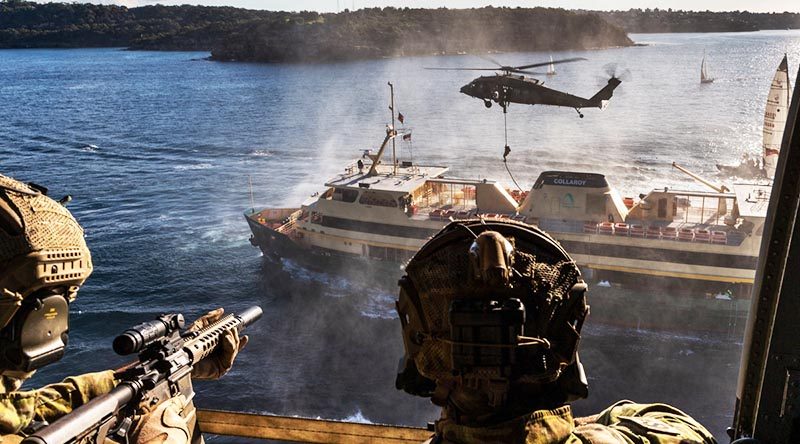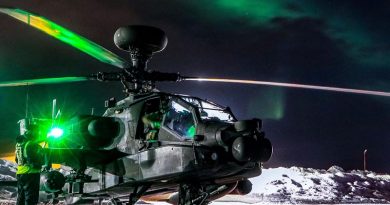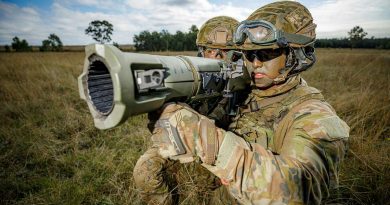Australia dumps MRH-90 for new Black Hawks

On the day before the Australian Army held a gala ball to formally farewell its last six Black Hawk helicopters, Minister for Defence Peter Dutton flew in to Victoria Barracks Sydney – on a Black Hawk helicopter – to announce that Australia was dumping the Black Hawk replacement in favour of new Black Hawks.
FILE PHOTO: Australian soldiers from 2nd Commando Regiment secure a Sydney ferry in Middle Harbour, New South Wales, during counter-terrorism training. Photo by Corporal Kyle Genner.
Minister Dutton told gathered media that Australia’s fleet of Eurocopter MRH-90 Taipan helicopters would be retired about 10 years earlier than planned and would be replaced by about 40 new-model MH-60 Black Hawks.
The MRH-90 fleet has been on the government’s projects of concern list for nearly 10 years, and is not airworthy enough to perform all roles – or even training flights, as evidenced by 5th Aviation Regiment leasing civilian helicopters to bolster their needs.
This announcement comes hot on the heals of news that 29 AH-64E Apaches are being purchased to replace our current fleet of 22 ARH Tiger, also manufactured by Eurocopter.
Minister Dutton’s full Black Hawk announcement went as follows…
PETER DUTTON:
The Australian Army has been well served by the Black Hawk that we see in the background, but it’s on its last flight, and we need to make sure that we have a replacement which is reliable and that also is interoperable with our counterparts and with our allies; and the Black Hawk is the favoured platform in the United States.
There are over a thousand Black Hawks flying around the world – they are safe, they’re reliable, and they will serve our purpose well.
I want to make sure that the men and women of the Australian Defence Force have the best available equipment because the work they’re doing is incredibly valuable. We know the work of our special forces and the SAS – that work relies on the Black Hawk – and we want to make sure that into the future we have a reliable air frame, and the Government has made a decision to purchase up to 40 of these Black Hawk helicopters. It will be important to get the training right, and there will be, I think, an easy transition for the flight crews from this Black Hawk into the new version.
The Black Hawk replacement is also going to be incredibly efficient. It will be much cheaper to run than the current Taipans, and we’ve found the Taipans to be unreliable. They haven’t lived up to expectation, and if we want the safest possible air frame for the men and women of the Australian Defence Force, then the Black Hawk was the obvious choice. Happy to take any questions.
QUESTION:
Minister, how much will ditching this Taipan fleet cost the Australian taxpayer?
PETER DUTTON:
Ironically, over the life of what we thought would be out to about 2037 of the Taipan, we will see savings of about two and a half billion dollars over that period because the Black Hawk is so much cheaper on a per hour basis to run than the existing Taipan. The Taipan is unreliable, there’s a lot of money that’s spent on maintenance and a lot of downtime of our pilots and air crews who should be up training and they should be flying these helicopters, and at the moment, in many cases, they just can’t. It’s why we need this capability sooner than later, and I’m hoping over the next couple of years we will have the new Black Hawk in service and that will be a great outcome for the ADF.
QUESTION:
What led to this decision?
PETER DUTTON:
The Taipan has been a project of concern for the last decade. It’s had nine instances where it’s been unsuitable to fly, and I’m just not going to put our people in that position. We want the best equipment for them and the Black Hawk clearly is going to provide that outcome
Getting up to 40 of them will, I think, send a very clear message to our partners and to our adversaries that the Australian Defence Force is serious about defending Australia and making sure that we can make a significant contribution when we’re called on. The humanitarian response – that comes from the Black Hawk in part – will give us, again, a greater edge within our own region. The Indo-Pacific is a very uncertain region, and we want the best equipment available for the Australian Defence Force.
QUESTION:
What is it about massive defence projects that means that they continually blow out in cost and also time?
PETER DUTTON:
I think people have an appreciation that there are millions of components in an airframe like this. When we’re flying around the SAS to an operation, we want to make sure that in the most difficult of flying circumstances the airframe is capable of performing that job safely. So it means many more components and much more technicality than we would normally have in a helicopter that flies for, you know, one of the television stations. It’s a much more complex project to deliver and to sustain that airframe. So it comes with a greater level of complexity, and I think the reliability and the history of the Black Hawk, not just in our experience, but in the experience of many countries around the world that use the Black Hawk, it just says to us that it’s an obvious choice to make.
We could have delayed this choice out to 2037, but it’s right that we’ve made the decision now so that we can get them into service more quickly.
QUESTION:
And in announcing this today, are you conceding that Australia has given up on trying to develop sovereign or a local capability for complex projects and going for those off-the-shelf options?
PETER DUTTON:
I think what we need to do is achieve capability sooner than later. I’ve been very clear about what I see as a growing threat within the Indo-Pacific, and I want the Australian Defence Force to have at its disposal the most effective equipment and the most highly trained people to deal with that reality.
Australia can’t put its head in the sand and pretend that there’s not an issue of concern within the Indo-Pacific – there is, and it’s not just Australia that’s pointing that out; there are many countries, including Japan and India, others in Europe and NATO now who are worried about the military build-up by the Chinese government here in the Indo-Pacific.
So we need to achieve our capability sooner rather than later, but also to build up that Australian industry content. There are many Australian families who are paying their mortgage off because of the support that they provide to the Australian Defence Force and we want that to continue to grow into the future.
Whilst these won’t be designed and built here, they’re a well-established, advanced, mature design. There will be a very significant investment into sustainment. So to sustain, and to prepare, and to keep these Black Hawks flying, that will mean Australian jobs, and it will mean money being spent in the Australian economy as well, which, as we know, has a very significant and positive benefit for the Australian economy.
QUESTION:
Just three months ago Australia caused great anger by dumping the French submarine program. Are you expecting more European fury over dumping the Taipan fleet?
PETER DUTTON:
I don’t expect so. I think when this project’s been a project of concern for the last 10 or 11 years, when there are now nine occasions where it hasn’t been possible to fly it, I think our partners understand that we cannot continue down that path. The cost of maintaining it, of flying it, just became prohibitive – not to mention putting our own people potentially in harm’s way if a helicopter is not safe to fly in.
So there’s a number of reasons that we’ve made that decision. I’ve spoken to the CEO of the company involved about my concerns a number of months ago, and Defence has been working constantly with the company to try and resolve the issues, but clearly they are unresolvable, and for that reason we’ve made the decision to terminate that program and to go with the Black Hawk program.
QUESTION:
On China, should we – given our decision to boycott the Olympics – are you expecting any retaliation on that?
PETER DUTTON:
I think this is a statement of common sense. I think the Prime Minister’s made exactly the right decision. This doesn’t stop the athletes from their once-in-a-lifetime opportunity to go to the Olympic Games; it respects that, but it does say that we’re deeply concerned about people, you know, the Uyghurs, for example. I just find it inconceivable in the year 2021 a young female tennis player, in this instance, can make serious allegations of sexual assault and rape and effectively be under house arrest and have her social media wiped. Nobody should tolerate that, and I think many countries around the world want China to deal with these issues in a responsible way, as our country would be expected to deal with it, as Canada or the United States or the United Kingdom and many others.
So it’s a statement of wanting to see an improved situation particularly in terms of human rights. I think we’re sending a clear message that Australia wants to be a good friend with China, but we want to be honest about our concerns, and I frankly think that that’s what the Australian public would expect as well.
QUESTION:
Initially China said no officials would be invited now and that no one cared about the boycott, now they’re saying the nation will face the consequences. Do you find it difficult to keep up with China’s position on this?
PETER DUTTON:
Look, I think there are lots of threats that come out from time to time. I think people should put it into perspective and understand that these threats are regularly made against Lithuania most recently, against the United States, against most countries that’ll express a counter view.
I find in these circumstances that, again, we’re better to be honest with the Australian people. The Chinese government’s laid out 14 pre-conditions before they normalise the relationship with us, but that effectively means surrendering our sovereignty, and the Australian Government will never do that.
We cannot argue for peace and stability in our own region from a position of weakness. Australia can only deter conflict in our region, can only, you know, prevent catastrophic outcomes in our region from a position of strength and not weakness, and that’s what our country is working towards, particularly with the acquisition of these Black Hawks and many other decisions that we’ll announce in the coming months.
We made the decision in AUKUS to acquire the nuclear-powered submarines because we want to maintain the regional superiority that we have with the Collins Class at the moment, and that’s important to our friends and our allies, but it’s also an important message for our adversaries or potential adversaries to hear as well.
Australia has a phenomenal respect around the globe for the way in which our people are trained and the way in which they’ve contributed to efforts to keep peace or to maintain peace or to re-establish peace, whether it’s been in world war conflicts or most recently in the
Middle East. We want to continue that level of expertise, the level of skill, the level of lethality within the Australian Defence Force.
In the end, we’re standing here in a free country today because of the efforts of the current serving men and women of the Australian Defence Force and their predecessors, and Australians should never forget that.
Thank you very much.
[end].
.

.
.






Replacing Blackhawk with Blackhawk?? Proof read?
B/s is more like it! Labour Party propergander .
I continue to be disappointed that journalists don’t follow up politicians statements that don’t answer the question asked. While the politicians aren’t held to account they will believe they are justified in spouting their own propaganda and continue to just ignore valid questions. It is the public that misses out on keeping our government honest.
In this instance it might be that the journalist was a member of the ADF and was somewhat constrained in how far they could push.